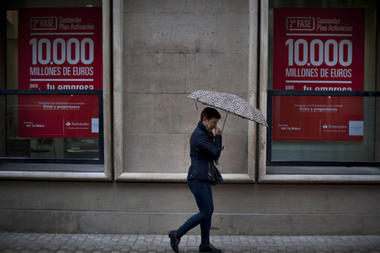Spain turns corner, as its recession officially ends
The country's unemployment also dropped for the second straight quarter. But experts warn that the majority of Spaniards will not feel the improvement any time soon.
A woman walks under an umbrella in front Santander Bank in Pamplona, Spain, on Wednesday. Spain's National Statistics Institute says the country's jobless rate edged down from 26.3 percent to 26.0 percent during the third quarter, a day after the Bank of Spain indicated that the recession was over.
Alvaro Barrientos/AP
Madrid
Spain's recession is officially over.
But while that's good news for Europe’s fifth biggest economy – and for the European Union as whole – there's still a long way to go before the majority of Spaniards feel the improvements.
Spain’s Central Bank said Wednesday that the economy grew 0.1 percent in the third quarter – a facially insignificant but symbolically important indicator of the end of more than two years of grueling recession and an affirmation of Europe’s slow recovery. And Spain's National Statistics Institute announced today that unemployment dropped for a second straight quarter, to just under 26 percent.
Exports have surged as a result of improved Spanish competitiveness, albeit primarily due to plummeting workers’ wages. Foreign investment is also rising, as stock markets once again swell with money from abroad.
It’s invariably the beginning of what most expect will be a very slow recovery and the result of successful policies that have reined in a government deficit, unsustainable borrowing costs, and decades of uncontrollable spending.
RECOMMENDED: Monitor Frontier Markets Free Trial. Intelligent analysis on events in frontier/emerging countries.
“This is good news that will improve confidence in Europe as a whole,” says Josep Oliver, an applied economics professor at the Universidad Autónoma de Barcelona. “Spain’s crisis can’t be understood without understanding crisis in Greece, Italy, or elsewhere. As Spain does its homework and reduces financial fragmentation, the European economy improves, and as the European economy improves, Spain benefits more.”
A long road
Still, the majority of Spaniards have little reason to cheer. The economy is indeed recovering, but it’s not something that is palpable on the street. Exports and foreign investment don’t create many jobs or translate into more spending. Domestic consumption continues to contract, weighing down the economy.
Even if it is dropping, unemployment remains near record highs and salaries continue to fall. In fact, the slight drop in unemployment in 2013 is the result of an increase in seasonal employment, and permanent employment continues to decrease.
There is no end in sight to the austerity and painful adjustments that Spain has been prescribed to recover from its 7.5 percent economic contraction since 2008. Consensus forecasts estimate there are still two or three more years at least before any real recovery trickles down.
The end of the recession “won’t translate into more spending,” Dr. Oliver says. “The Spanish economy is heavily indebted and internal demand won’t improve soon, meaning the economy will continue relying on exports.”
In fact, the government of Mariano Rajoy plans little change in spending in 2014 and has already announced more spending cuts to continue cutting the deficit below 3 percent by 2016, the European target.
Spain’s public deficit is the highest in the European Union, topping 10 percent of the gross domestic product. The government expects the GDP for 2013 to shrink 1.3 percent, in line with other forecasts, while the economy in 2014 is expected to grow 0.7 percent, far below what is required for improvements to translate into noticeable improvements.
And there are numerous risks to Spain's recovery, mostly from abroad. Another budget showdown in the United States; a winding down of stimulus public spending, especially in the US; or a slowdown in China could all put Spain back into the line of fire.
© The Christian Science Monitor. All Rights Reserved.
http://www.csmonitor.com/World/Europe/2013/1024/Spain-turns-corner-as-its-recession-officially-ends
